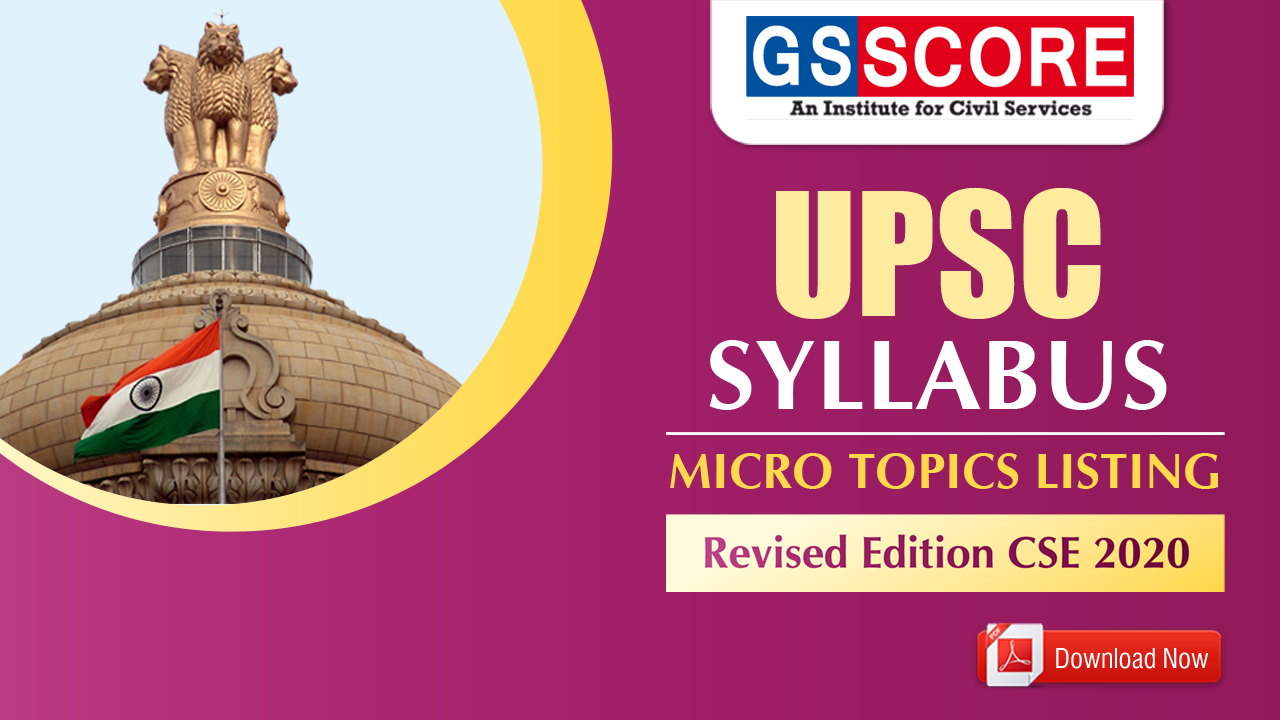VisionIAS
07:21
UPSC PRELIMINARY EXAMINATIONS DECODED SYLLABUS


Click Here to download UPSC PRELIMINARY EXAMINATIONS DECODED SYLLABUS
Click Here to Like our Facebook page for latest updates and free ebooks
Material For Exam


UPSC IAS Mains 2020: Detailed Syllabus for GS Paper I (History, Geography & Indian Society)
History | Modern Indian History India Post Independence World History Art & Culture |
Geography | Indian Geography World Geography |
Indian Society | Social Issues, and Developments in Indian Society |

| सामान्य अध्ययन प्रश्नपत्र-1 भारतीय विरासत और संस्कृति, विश्व का इतिहास एवं भूगोल और समाज | GS-Paper 1 Indian Heritage and Culture, History and Geography of the World and Society | ||
| क्र.सं. | विषय | S.No. | Topics |
| 1. | भारतीय संस्कृति में प्राचीन काल से आधुनिक काल तक के कला के रूप, साहित्य और वास्तुकला के मुख्य पहलू शामिल होंगे। | 1. | Indian culture will cover the salient aspects of Art Forms, Literature and Architecture from ancient to modern times. |
| 2. | 18वीं सदी के लगभग मध्य से लेकर वर्तमान समय तक का आधुनिक भारतीय इतिहास– महत्त्वपूर्ण घटनाएँ, व्यक्तित्व, विषय। | 2. | Modern Indian history from about the middle of the eighteenth century until the present- significant events, personalities, issues. |
| 3. | स्वतंत्रता संग्राम– इसके विभिन्न चरण और देश के विभिन्न भागों से इसमें अपना योगदान देने वाले महत्त्वपूर्ण व्यक्ति/उनका योगदान। | 3. | The Freedom Struggle – its various stages and important contributors/contributions from different parts of the country. |
| 4. | स्वतंत्रता के पश्चात् देश के अंदर एकीकरण और पुनर्गठन। | 4. | Post-independence consolidation and reorganization within the country. |
| 5. | विश्व के इतिहास में 18वीं सदी तथा बाद की घटनाएँ यथा औद्योगिक क्रांति, विश्व युद्ध, राष्ट्रीय सीमाओं का पुनःसीमांकन, उपनिवेशवाद, उपनिवेशवाद की समाप्ति, राजनीतिक दर्शन जैसे साम्यवाद,पूंजीवाद, समाजवाद आदि शामिल होंगे, उनके रूप और समाज पर उनका प्रभाव। | 5. | History of the world will include events from 18th century such as Industrial revolution, World wars, Redrawal of national boundaries, Colonisation, Decolonisation, Political philosophies like Communism, Capitalism, Socialism etc.- their forms and effect on the society. |
| 6. | भारतीय समाज की मुख्य विशेषताएँ, भारत की विविधता। | 6. | Salient features of Indian Society, Diversity of India. |
| 7. | महिलाओं की भूमिका और महिला संगठन, जनसंख्या एवं संबद्ध मुद्दे, गरीबी और विकासात्मक विषय, शहरीकरण, उनकी समस्याएँ और उनके रक्षोपाय। | 7. | Role of women and women’s organisations, Population and associated issues, Poverty and developmental issues, Urbanization, their problems and their remedies. |
| 8. | भारतीय समाज पर भूमंडलीकरण का प्रभाव। | 8. | Effects of globalisation on Indian society. |
| 9. | सामाजिक सशक्तीकरण, संप्रदायवाद, क्षेत्रवाद और धर्मनिरपेक्षता। | 9. | Social empowerment, Communalism, Regionalism & Secularism. |
| 10. | विश्व के भौतिक भूगोल की मुख्य विशेषताएँ। | 10. | Salient features of world’s physical geography. |
| 11. | विश्वभर के मुख्य प्राकृतिक संसाधनों का वितरण (दक्षिण एशिया और भारतीय उपमहाद्वीप को शामिल करते हुए), विश्व (भारत सहित) के विभिन्न भागों में प्राथमिक, द्वितीयक और तृतीयक क्षेत्र के उद्योगों को स्थापित करने के लिये ज़िम्मेदार कारक। | 11. | Distribution of key natural resources across the world (including South Asia and the Indian sub-continent); factors responsible for the location of primary, secondary and tertiary sector industries in various parts of the world (including India). |
| 12. | भूकंप, सुनामी, ज्वालामुखीय हलचल, चक्रवात आदि जैसी महत्त्वपूर्ण भू-भौतिकीय घटनाएँ, भौगोलिक विशेषताएँ और उनके स्थान- अति महत्त्वपूर्ण भौगोलिक विशेषताओं (जल-स्रोत और हिमावरण सहित) और वनस्पति एवं प्राणिजगत में परिवर्तन और इस प्रकार के परिवर्तनों के प्रभाव। | 12. | Important Geophysical phenomenasuch as Earthquakes, Tsunami, Volcanic activity, Cyclone etc., geographical features and their location- changes in critical geographical features (including Water bodies and Ice-caps) and in flora and fauna and the effects of such changes. |


| S.No. | Topics |
| 1. | Improving Sentences |
| 2. | Spotting Errors |
| 3. | Synonyms & Antonyms |
| 4. | Fill in the Blanks |
| 5. | Active/ Passive Voice |
| 6. | Verbs |
| 7. | One-Word Substitution |
| 8. | Idioms & Phrases |
| 9. | Cloze Passage |
| 10. | Comprehension Passage |
